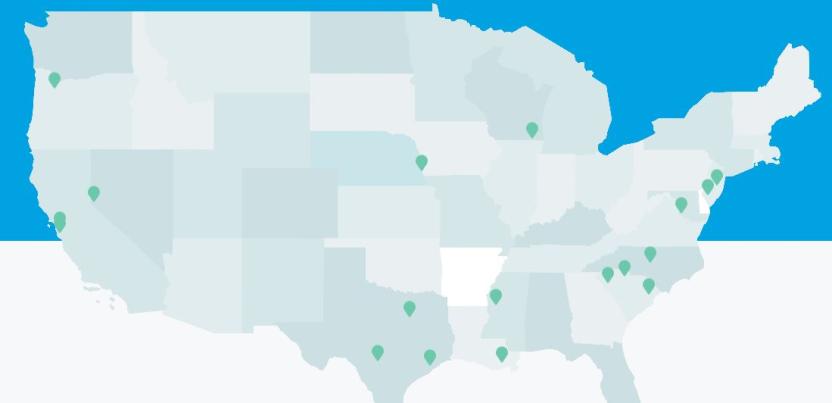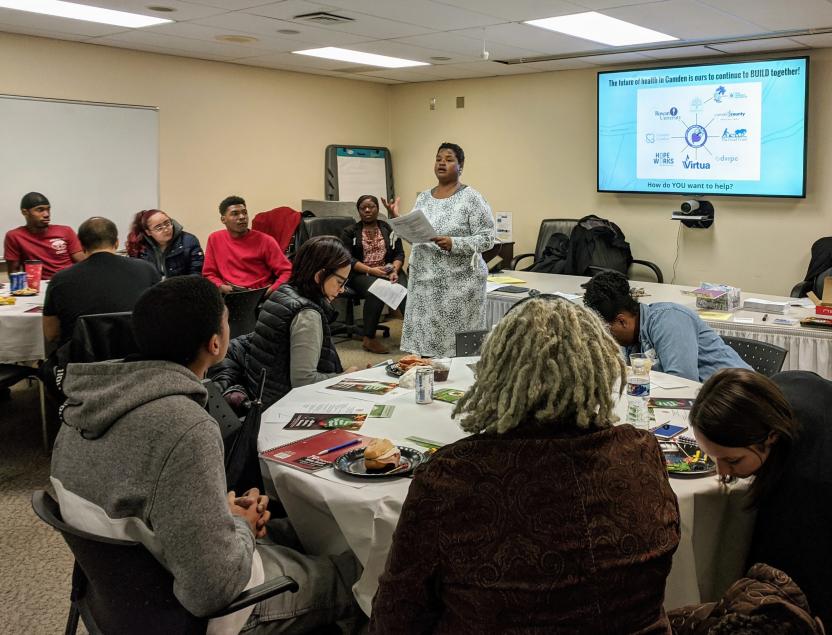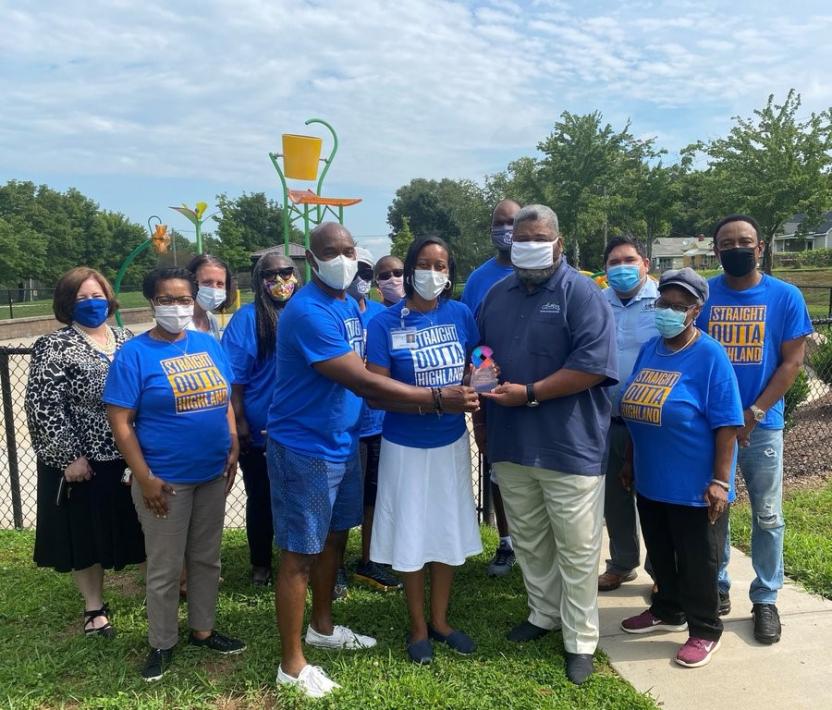BUILDing Cross-Sector Partnerships for Health
Story at a Glance
- Since 2015, The BUILD Health Challenge® (BUILD) has convened and supported partnerships between community-based organizations, hospitals and health systems, and local health departments.
- These innovative partnerships are designed to deliver the types of sustained upstream initiatives that communities need to significantly affect health inequities.
- ChangeLab Solutions has provided technical assistance on a variety of issues to BUILD community partners since 2019, with a specific emphasis on law and policy.
BUILDing for the Future
Imagine you’re a community health advocate trying to improve healthy food access in Dallas, Texas, maternal health in Sunflower County, Mississippi, or housing stability and affordability in Vallejo, California. What tools and know-how do you require? Which partners need to be on hand to help get the job done?
Throughout the United States, innovative partnerships are redefining what it means to tackle health inequities that are rooted in systemic injustices. One example of a health initiative that is creating cross-sector partnerships is The BUILD Health Challenge® (BUILD) — an initiative supported by regional and national funders and based at the de Beaumont Foundation.
Each collaborative features at least three partner organizations: a community-based organization, a local health department, and a hospital or health care system.
Founded in 2015, the initiative is now in its third award cycle, which supports collaboratives in 18 communities across the country and runs from 2019 until July 2022. Each collaborative features at least three partner organizations: a community-based organization (CBO), a local health department, and a hospital or health care system. Most of the BUILD collaboratives in the third cohort (3.0) have more than the core three partners contributing to their project.
Unlike many other cross-sector health initiatives, the BUILD model of change centers community-based organizations; a CBO is the lead partner for each project. This approach means that funding for the projects, which comes from BUILD and is matched by the health care system partner, flows directly to the CBO partner for budgeting and disbursement. BUILD emphasizes projects that seek to advance health equity through strategies with the following qualities:
- Bold — aimed at long-term policy or systems change
- Upstream — focused on the social, environmental, and economic factors that have the greatest influence on community health
- Integrated with a variety of stakeholders and partners
- Local — centered on residents and community members
- Data-driven in key actions and decision making
ChangeLab Solutions joined the BUILD 3.0 team in 2019 as its technical assistance provider on policy and legal issues. Our day-to-day role in the project involves advising BUILD collaboratives on everything from equity-informed policymaking to best practices for community engagement.
“I believe that ChangeLab is an excellent fit for supporting the BUILD 3.0 communities,” says ChangeLab Solutions managing director Phebe Gibson, who coordinates ChangeLab’s contributions to the BUILD initiative. “Our staff has deep expertise across a wide range of policy areas, which is just what the communities participating in this initiative need to move their work forward.”
Our Impact on the Ground
The BUILD 3.0 teams are working in many issue areas, including healthy food access, maternal health, and housing. ChangeLab Solutions’ staff of attorneys, policy analysts, and planners is well equipped to support the policy areas chosen by the BUILD 3.0 teams.
The team in Camden, New Jersey, for example, is composed of seven partners, including two CBOs, three health care partners, a local government partner, and a university partner. Working together as Roots to Prevention, this coalition has successfully created a healthy foods prescription program that enables Camden residents to access healthy food from local farmers and producers. Roots to Prevention’s long-term aim is to reduce inequities in diet-based chronic diseases while also creating jobs for people from the community.
ChangeLab Solutions has been supporting this endeavor by sharing resources about how other hospital systems have implemented local food purchasing programs. ChangeLab staff have also provided Roots to Prevention with a memo about liability, risk management, and insurance considerations for sponsors of urban gardens, as well as examples of the types of agreements and memorandums of understanding that can help the partnership endure beyond the BUILD grant-funding cycle.
"ChangeLab Solutions has been indispensable for getting our project to the next level.”
“Whether it is helping us with our evaluation efforts or advising us on how best to create partnerships with urban gardens and other local farmers, ChangeLab Solutions has been indispensable for getting our project to the next level,” says Jonathan Wetstein, the Roots to Market manager at Roots to Prevention.
"We really appreciated how the ChangeLab team assigned to our project had a personal interest in our efforts,” Wetstein adds. “This really shone through every time research help was needed for a specific policy or when identifying a new strategic solution."
The BUILD 3.0 team in the Alief neighborhood of Houston, Texas, is working together as the Maternal Upstream Management (MUM) project to improve newborn and maternal health outcomes. Alief is a suburban community in Harris County that has grown rapidly in population over the last few decades. Students in Alief public schools speak more than 80 languages and dialects, reflecting the fact that many Alief residents are recent immigrants to the United States. And while the community benefits from high levels of economic and cultural diversity, residents also face challenges related to poverty and underemployment. Currently, 24.7% of Alief residents have incomes below the poverty line.
Comprising a health system partner, a government partner, a formal payer partner, and two community-based organizations, the Alief collaborative has focused on connecting the neighborhood’s young moms and pregnant women with care, services, and resources. The project also helps young moms and pregnant women invest in themselves through training and education opportunities. Over the longer term, the MUM project aims to create a community-based support system so that all women living in the Alief area can access high-quality, affordable reproductive care, early prenatal care, and resources on family planning and parental skills. ChangeLab Solutions staff have provided the Alief team with legal and policy research on a variety of topics and have helped the team make connections with other individuals and organizations working on similar projects around the country.
“I’m very grateful for the expertise and support that ChangeLab has given to our project,” says Natasha Butler, project manager at MUM and Hope Clinic. “They have shared invaluable resources that have improved advocacy and helped remove barriers to governmental services that affect women, infants, and children.”
Lessons Learned & Applied
Not all BUILD 3.0 communities are working on projects that involve food security, maternal health, or housing. For instance, the team in Milwaukee, Wisconsin’s Sherman Park neighborhood is working on community connectedness and violence reduction, while the team in Omaha, Nebraska, is leading a project to develop community-led approaches to improving mental health.
“As a technical assistance team, our role is to lend communities an extra set of helping hands,” explains Phebe Gibson. “Sometimes, that requires providing an in-depth legal analysis. Other times, it requires making an introduction or assisting with a campaign of public service announcements."
“ChangeLab Solutions has learned that it’s important for community health coalitions to embrace relationships and trust building from the get-go.”
One prominent theme that has been reinforced during ChangeLab’s involvement in BUILD 3.0 efforts is that trust building and relationship building are critical to the success of collaborative efforts. Relationships of trust among stakeholders and community members provide a strong foundation for implementing upstream policy and systems change efforts.
“ChangeLab Solutions has learned that creating lasting change requires law and policy know-how,” says Phebe Gibson. “But it’s also so important for community health coalitions to embrace relationships and trust building from the get-go.”
The BUILD team in Gastonia, North Carolina, is doing an excellent job of getting community members excited about their efforts to improve healthy food access and reduce obesity and other diet-related chronic diseases. A focal point of the project is the creation of RAMS Kitchen, a healthy food enterprise that prepares and serves affordable grab-and-go meals for residents of Gastonia’s Highland neighborhood. ChangeLab staff members have provided the team with research to bolster their business model, assistance with their community needs assessments, and other supports.
“We started this project by basically providing affordable food access, using a church kitchen,” says Donyel Barber, community centered health director at Kintegra Health. “And our approach to combining local flavors with healthy choices has been a hit so far with the community members we serve.
“We’ve recently expanded to running a food truck in addition to the kitchen,” she adds. “We’re excited to bring this visibility to the success we’ve achieved as a neighborhood partnership, working together toward a common goal.”
It Takes a (Cross-Sector) Village
Upstream, community-based health projects — like those pursued by the BUILD community collaboratives — confront the fundamental drivers of health inequity.* At its core, the BUILD model of bringing together different types of stakeholders addresses structural barriers that limit the ability of individual stakeholders to advance health equity.
Each of the three types of stakeholders — community-based organizations, health systems, and public health agencies — brings its own strengths and areas for growth to community health projects. By convening these multi-sectoral institutions and organizations and facilitating collaboration between them, the BUILD approach helps them work together to overcome disparities in opportunity to improve health in their community.
For instance, unlike health systems and governments, community-based organizations might not otherwise have the opportunity to access population health data or some forms of technical expertise. Health systems and governments, on the other hand, might not have the same levels of trust from community members as CBOs. By partnering, these stakeholders from different sectors can combine their unique strengths to create a more effective whole that can address the root causes of health inequities.
A clear illustration of this principle in action comes from the BUILD 3.0 team in Dallas, Texas. This team works to connect people who are experiencing food insecurity with food pantries in the south Dallas area, through coordination with local health care providers.
Part of their project involves identifying ways to make the health system’s internal database compatible with the food pantry and distribution center's own systems, so that it’s easier to provide referrals and follow-through from the food pantry. ChangeLab Solutions staff have provided the Dallas team with research and connections to other communities that have already navigated options for coordinating health care and social service providers, including considerations related to third-party vendors, information technology systems, and compliance with the Health Insurance Portability and Accountability Act of 1996.
“Our involvement in The BUILD Health Challenge is an amazing showcase of the full array of legal and policy assistance that ChangeLab Solutions can provide,” says Phebe Gibson. “Our staff is truly energized and inspired by all the amazing work that these 18 communities are doing.”
* ChangeLab Solutions has identified five fundamental drivers of health inequity: (1) structural discrimination, (2) income inequality and poverty, (3) disparities in opportunity, (4) disparities in political power, and (5) governance that limits meaningful participation. Our work as an organization centers on law and policy changes that address these five drivers of inequity.
By Patrick Glass
3/22/2022
Photo credit: Community members and team members work in a community garden in Camden, NJ. Photo courtesy of the Camden BUILD team.


